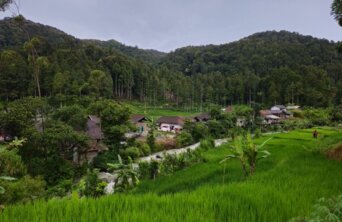- About
- Topics
- Picks
- Audio
- Story
- In-Depth
- Opinion
- News
- Donate
- Signup for our newsletterOur Editors' Best Picks.Send
Read, Debate: Engage.
| topic: | Renewables |
|---|---|
| located: | Indonesia |
| editor: | Leo Galuh |
The Gununghalu village community, located in Indonesia's West Bandung Regency in West Java, is an excellent model for renewable energy independence that is applicable worldwide.
The community can generate its electricity from river flow energy, eliminating the need to rely on the state-owned electricity company, Perusahaan Listrik Negara (PLN).
The Gununghalu micro hydro power plant harnesses the potential of abundant river water, enabling it to generate electricity sustainably without producing high carbon emissions.
Toto Sutanto, the local community leader, told Fair Planet the community built the power plant in 2007 after noticing the ample water flow of the Ciputri River was sufficient to construct a micro hydro power plant.
The community received grant funds from the West Java Provincial Government via the Energy and Mineral Resources Agency.
In the 1990s, the area lacked electricity. Its predominantly farming community relied on basic technology for power, such as water wheels, with most houses situated along the Ciputri River.
Indonesia’s West Java province has a renewable energy potential of 192 gigawatts, but only around 3.41 gigawatts, or 2 per cent, are currently utilised.
The province has various renewable energy sources, including solar, hydro, geothermal, biomass, and wind power. However, some residents still lack access to electricity due to pricing and distribution disparities. For instance, the Indonesian state wire Antara reported that approximately 204,608 families in West Java province are unable to access electricity.
After a year as the Gununghalu micro hydro power plant administrator, it transitioned to the Rimba Lestari Gununghalu Cooperative, a coffee processing cooperative led by Sutanto, in 2008.
Out of 100 households in Gununghalu village, 80 use the power plant's hydroelectricity, each receiving 450 watts of power, according to Sutanto.
The residents opt for micro hydro power plant electricity due to its affordability and reliability. Meanwhile, others utilise electricity from PLN or a combination of both.
In terms of cost, electricity from river flow is more economical, priced at around 25,000 Indonesian Rupiah (USD 1.57) per month, compared to PLN's fees, which amount to 50,000 Indonesian Rupiah (USD 3.15) per month.
Communal power management, including renewable energy, is more sustainable and benefits the community.
The Gununghalu micro hydro power plant provides power and encourages residents to conserve the surrounding environment. Since its operations depend on a steady water flow, Sutanto said locals are hesitant to disrupt the nearby forest.
Preserving the untouched forests is crucial for sustaining the Ciputri River’s water flow for the micro hydro power plant. Therefore, Gununghalu village's green forest is still whole.
In addition, to broaden its usage, the residents agreed to install one more micro hydro power plant unit. Construction started in February 2024, and Sutanto says the new unit will be able to generate 30 kilowatts of electricity.
Image by Leo Galuh.

